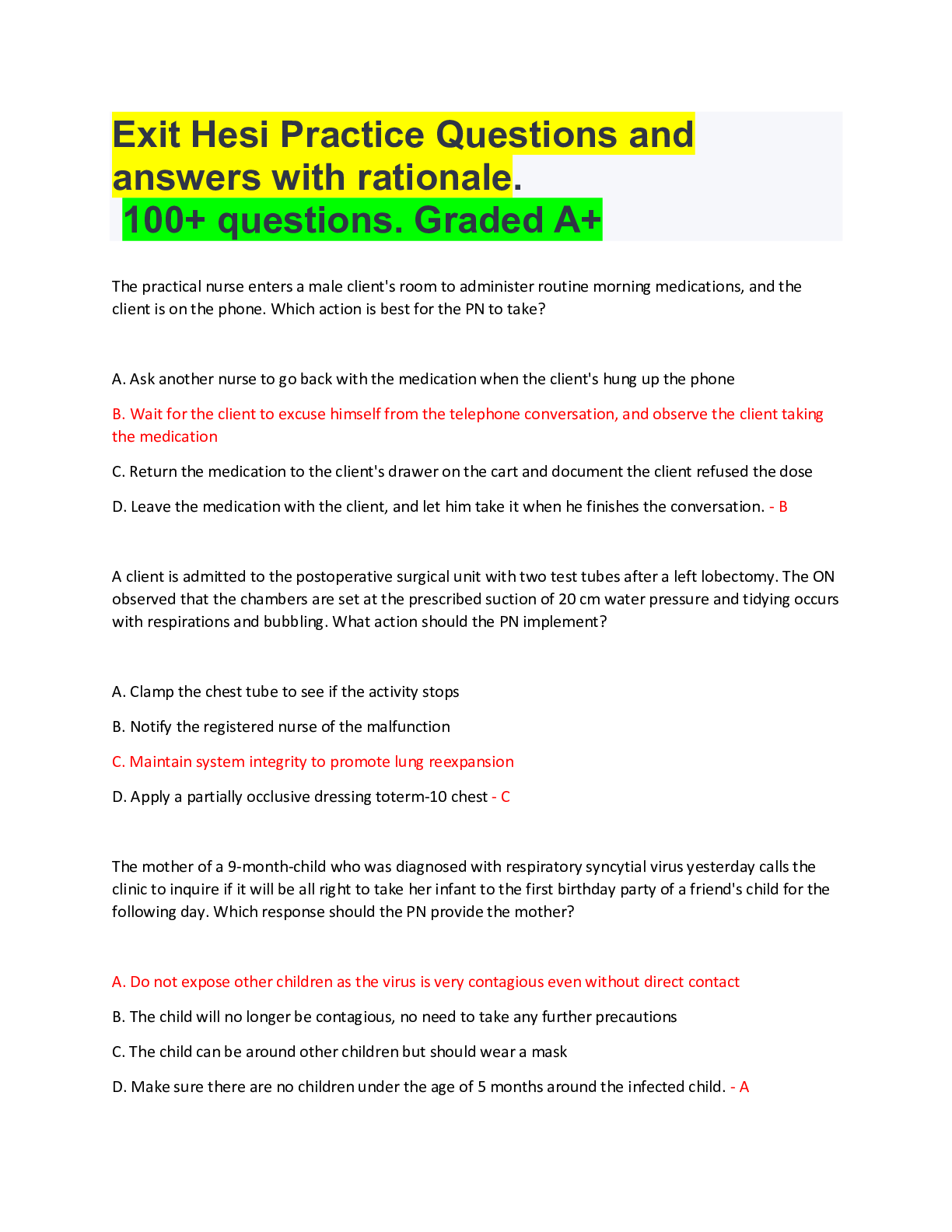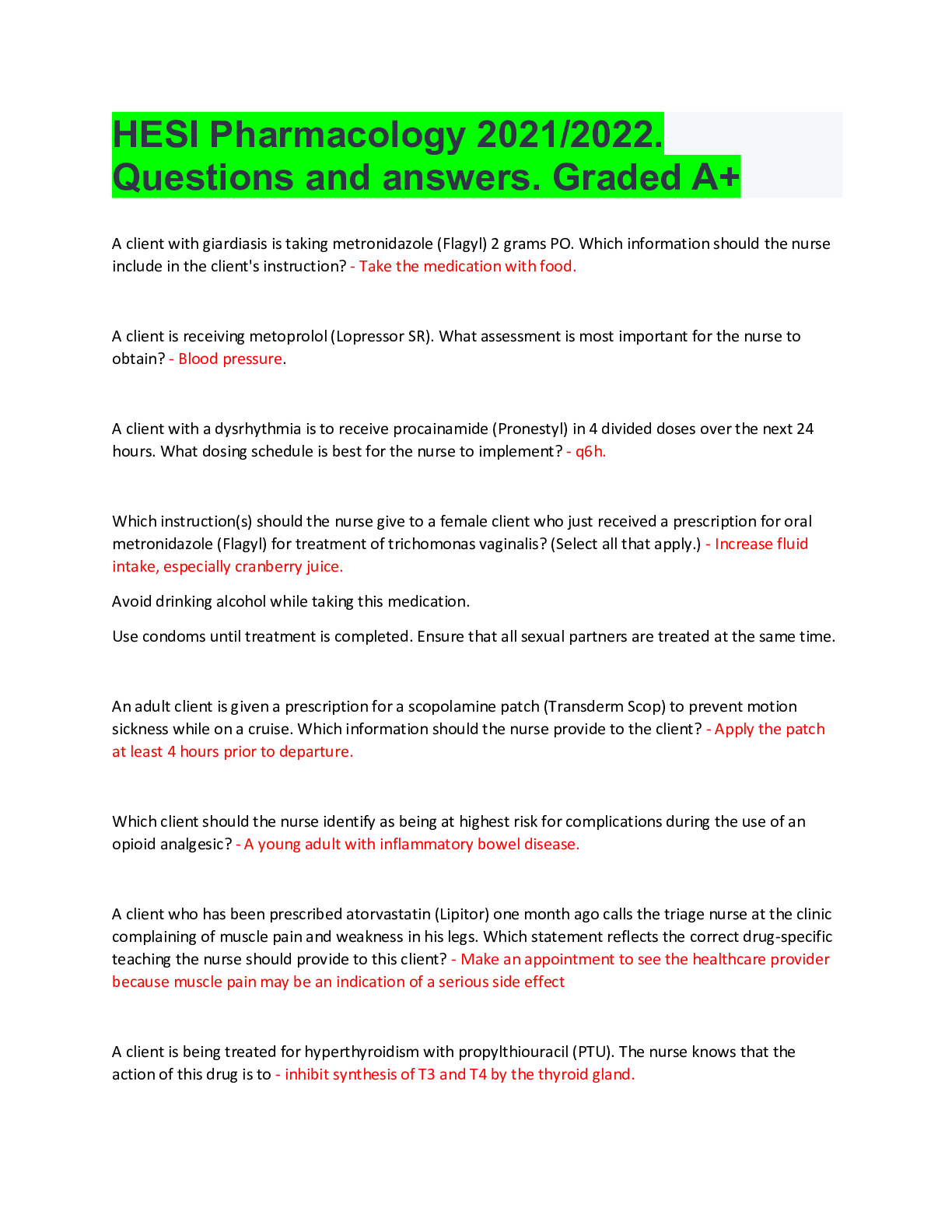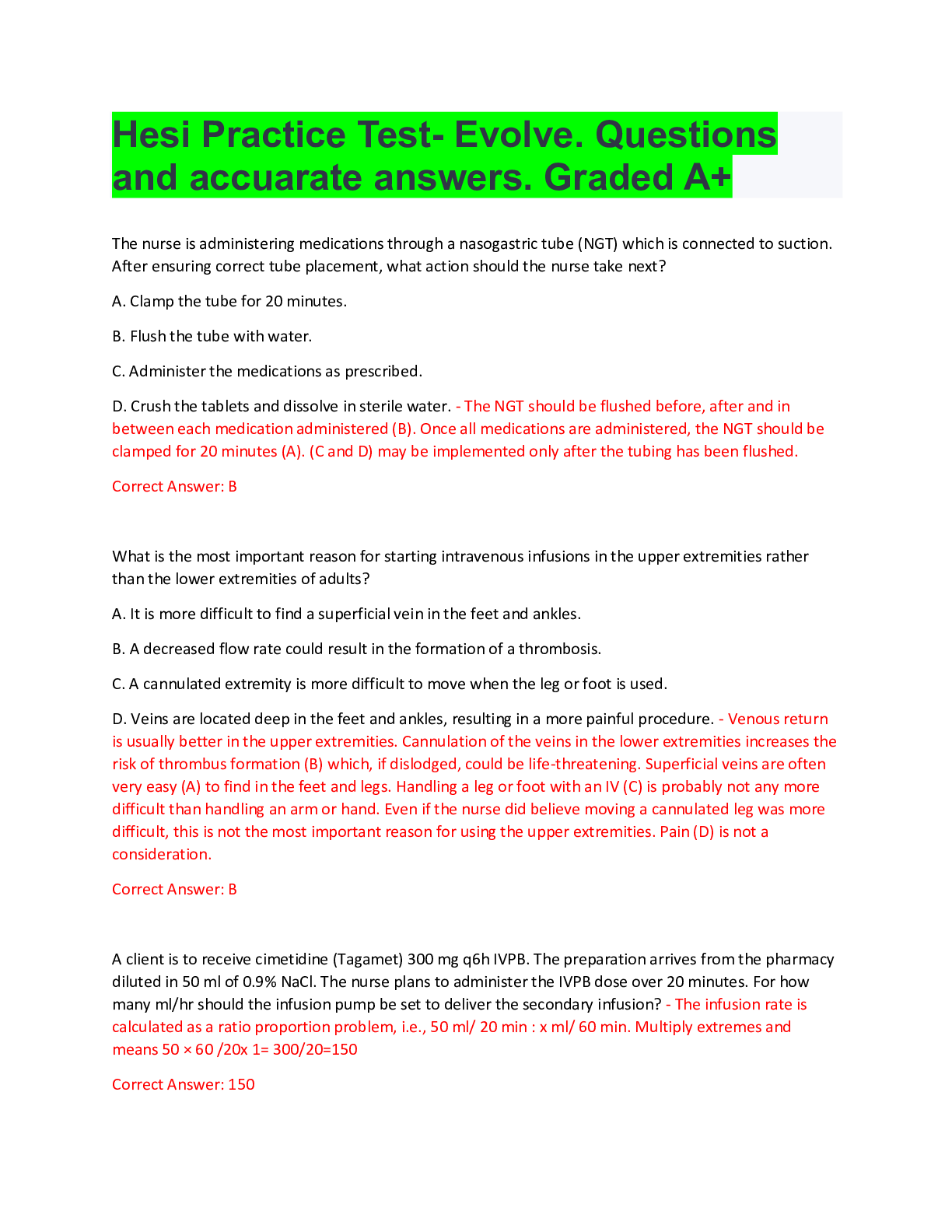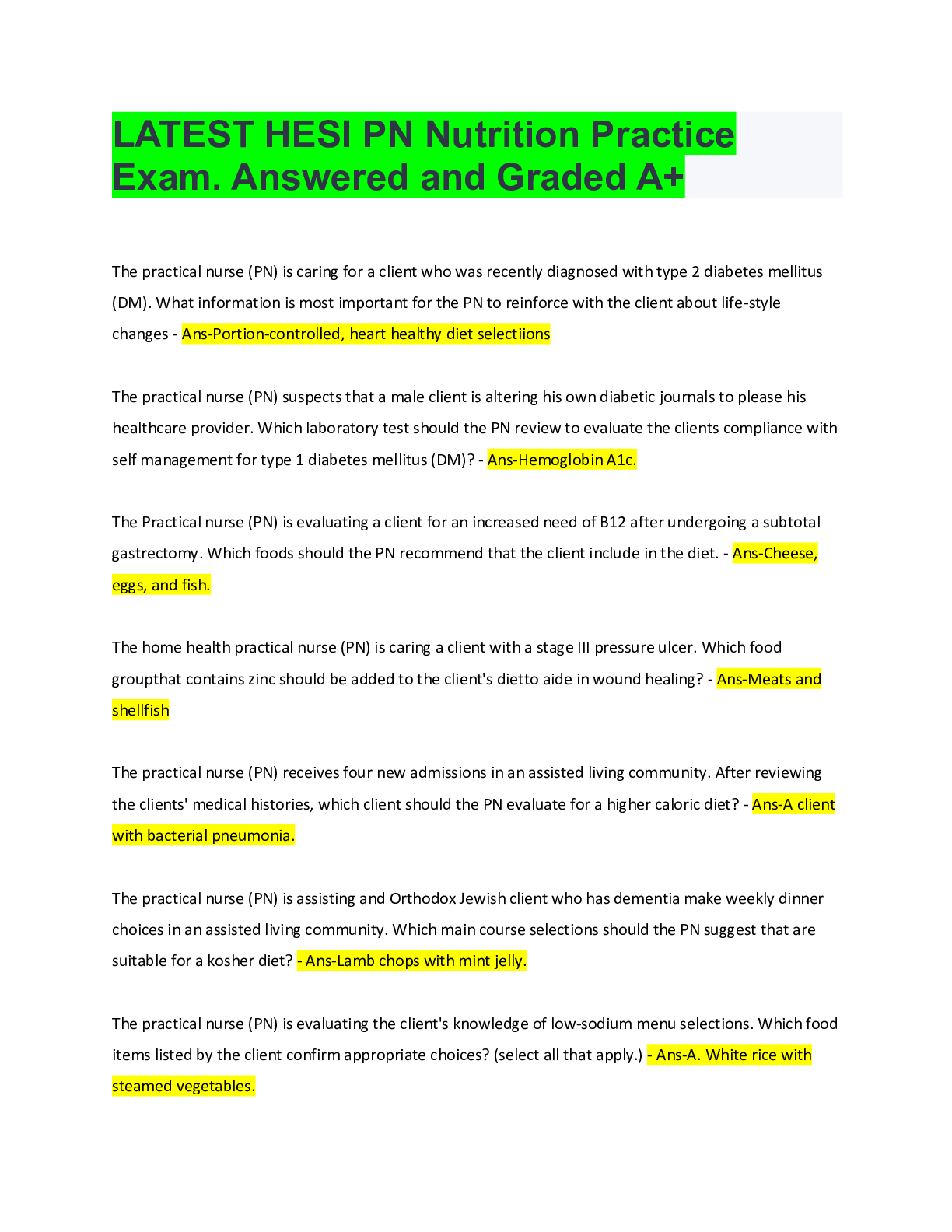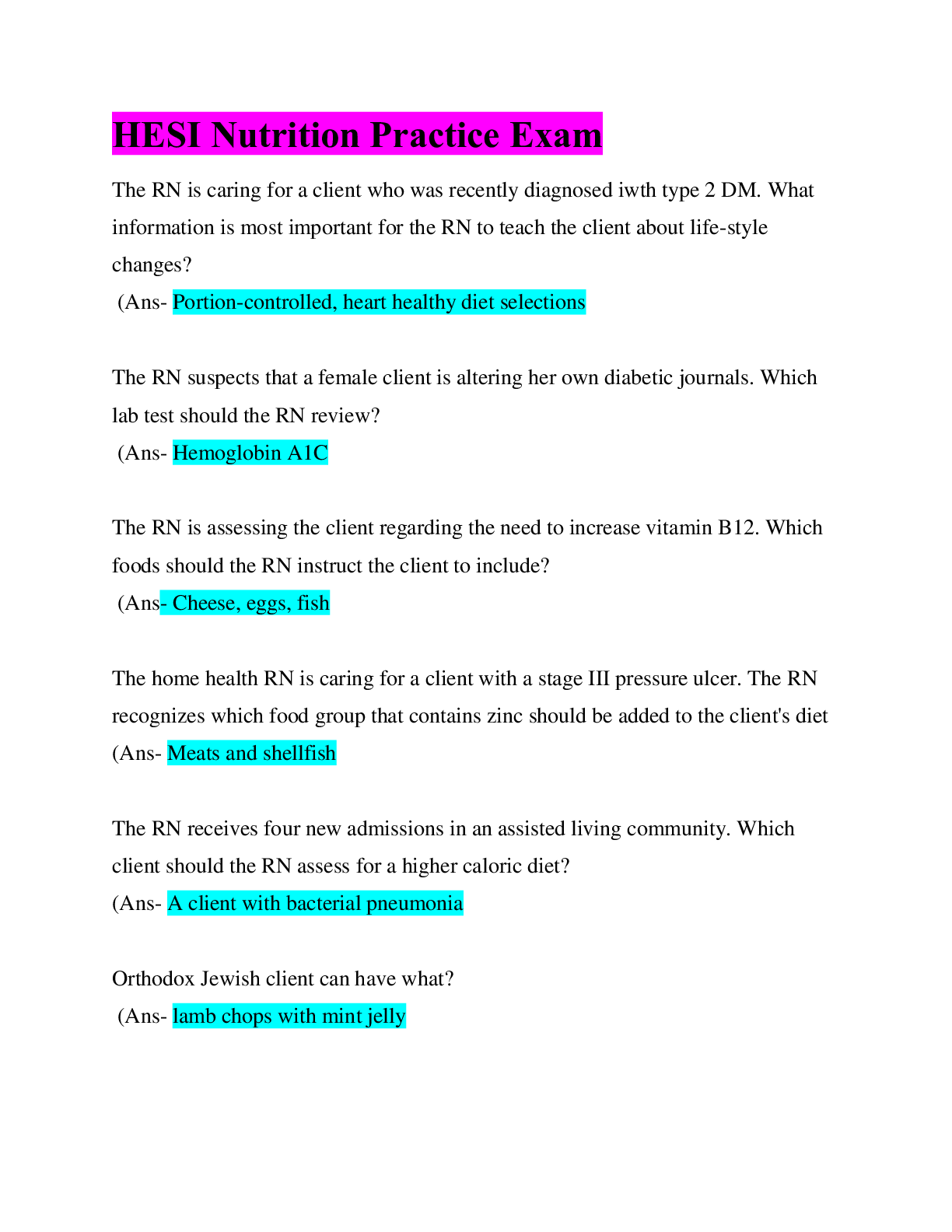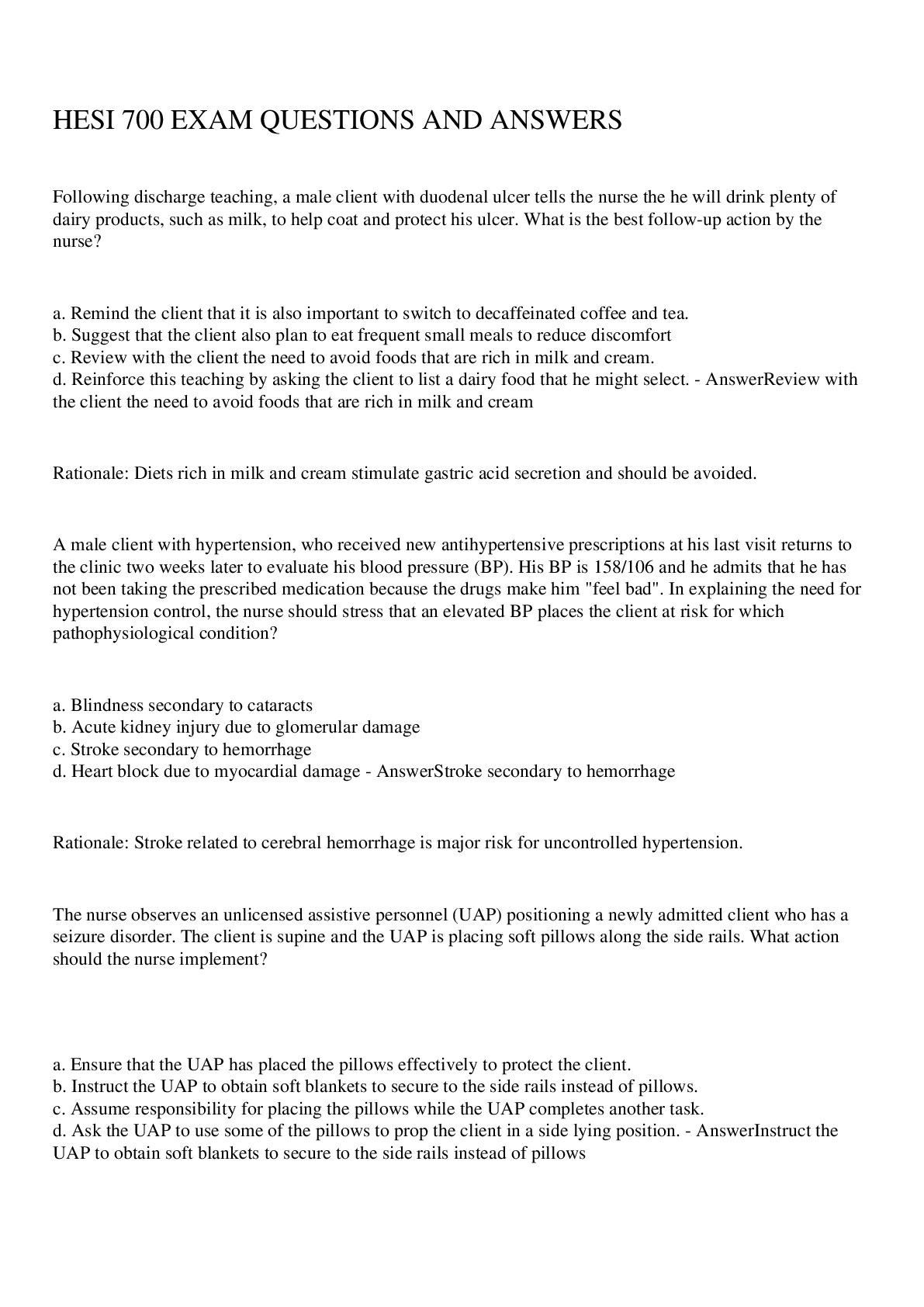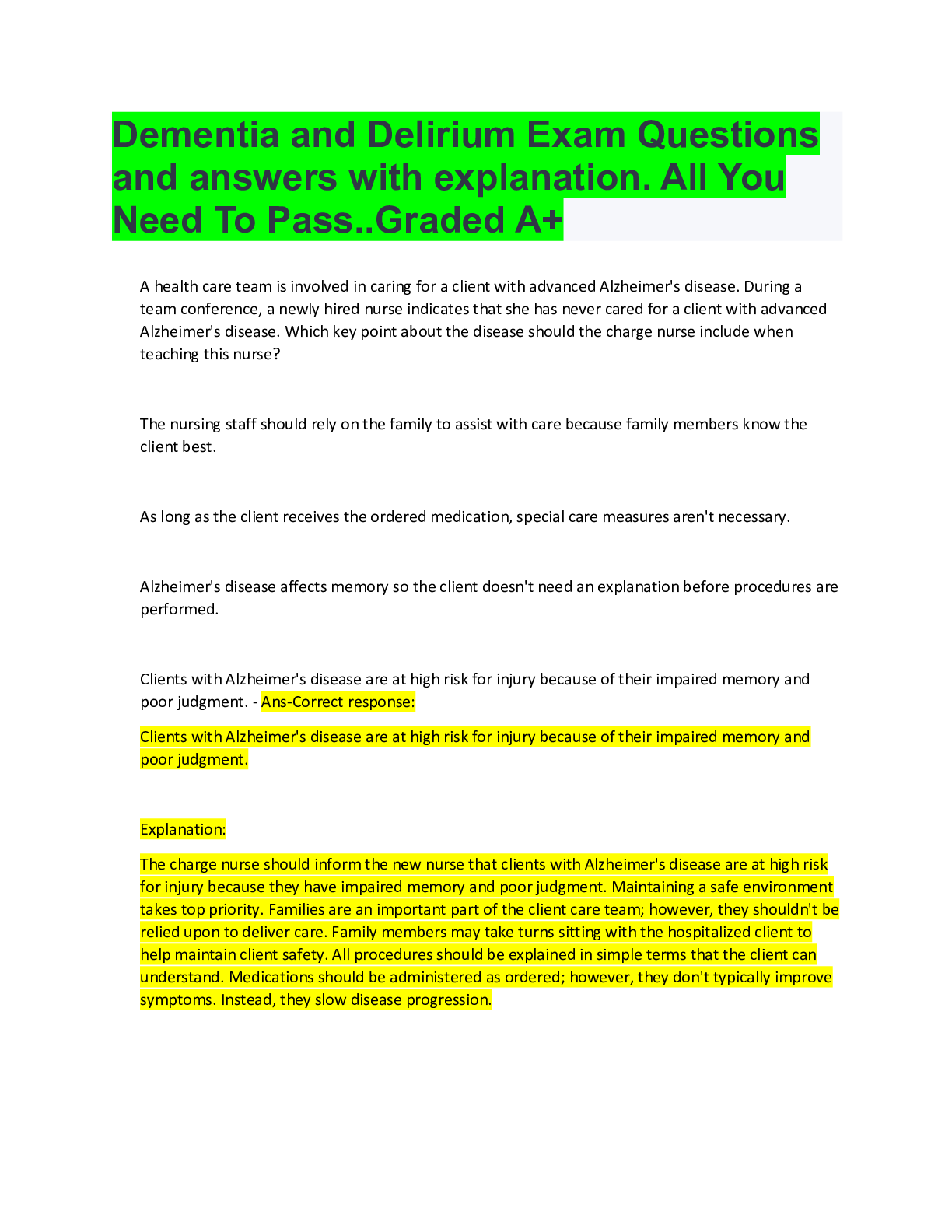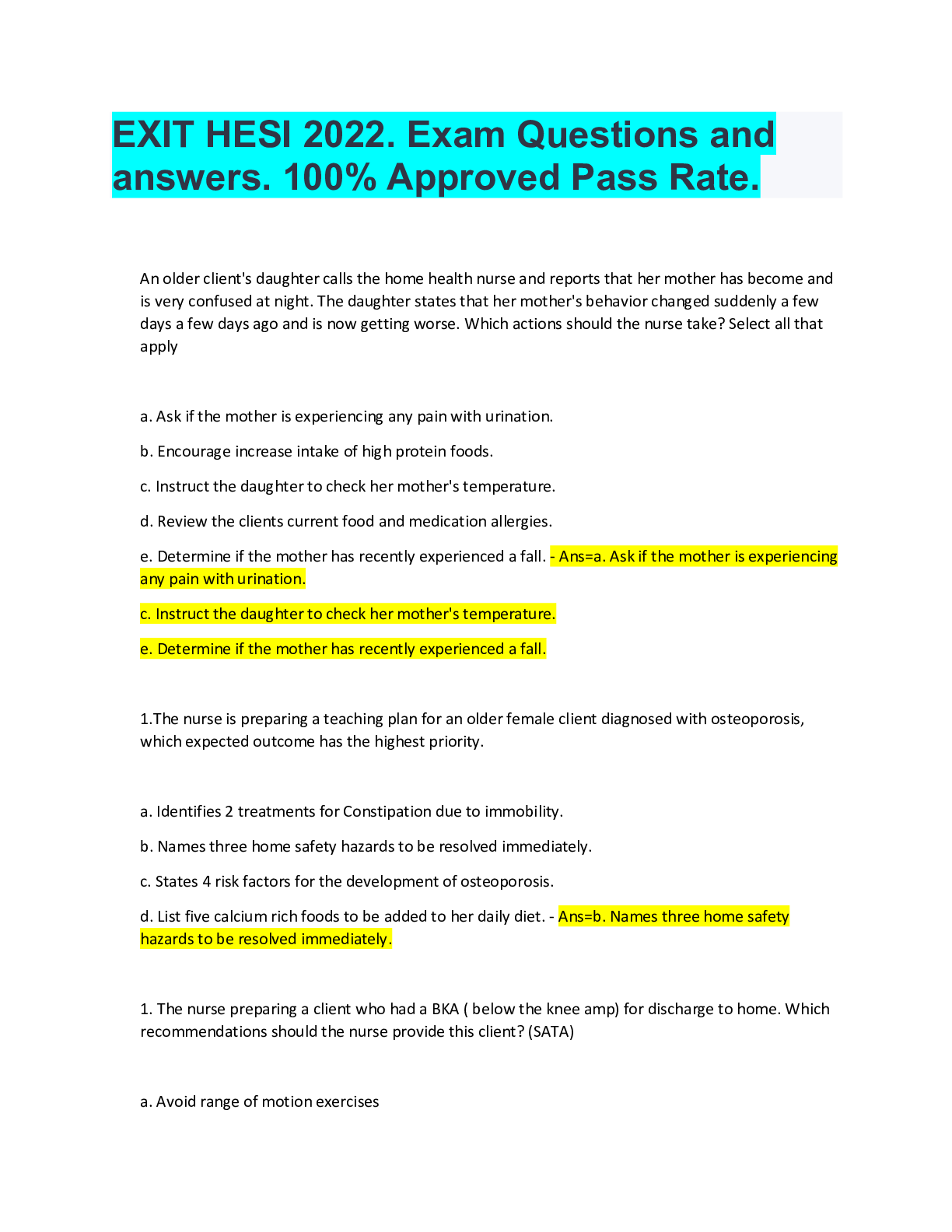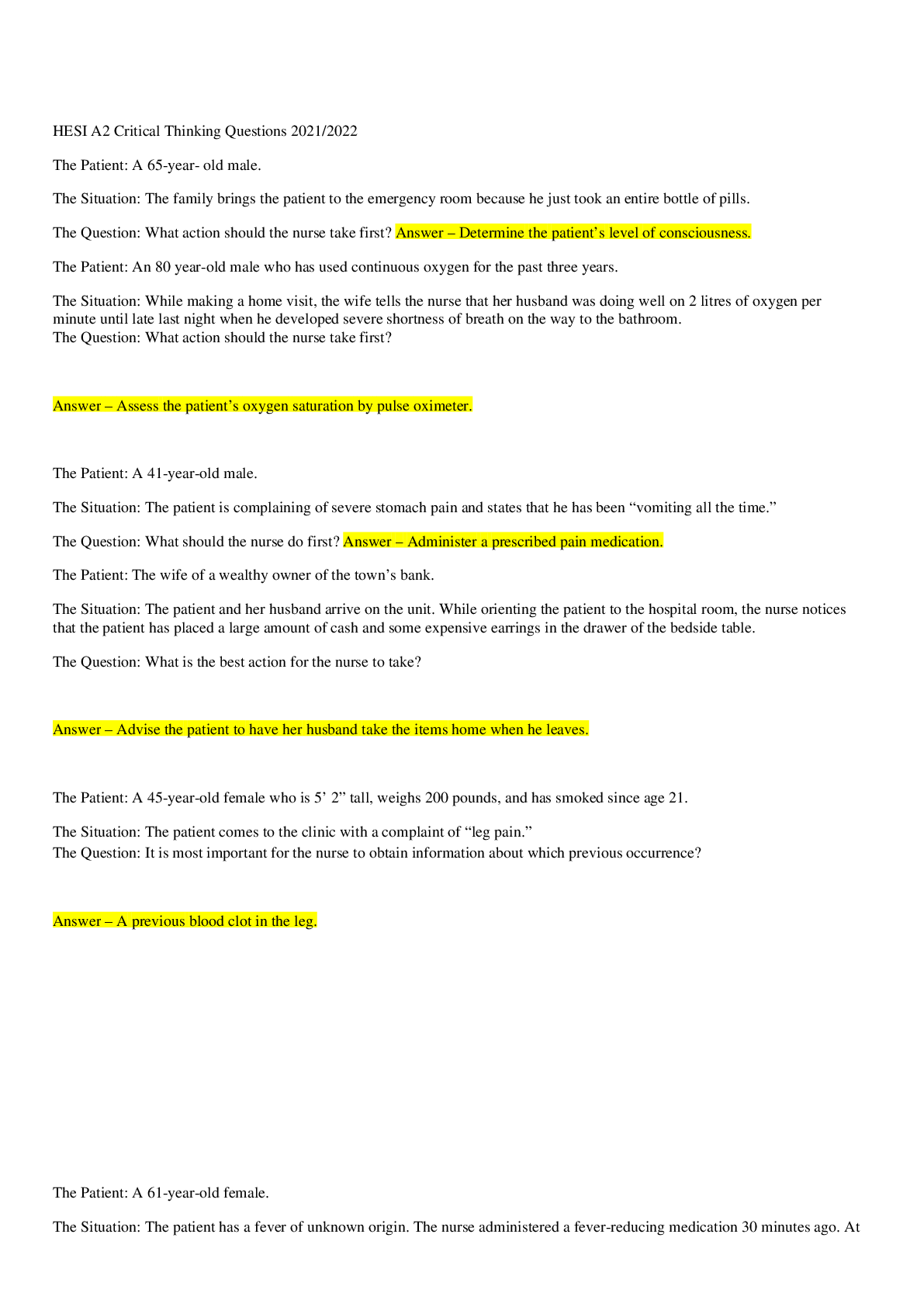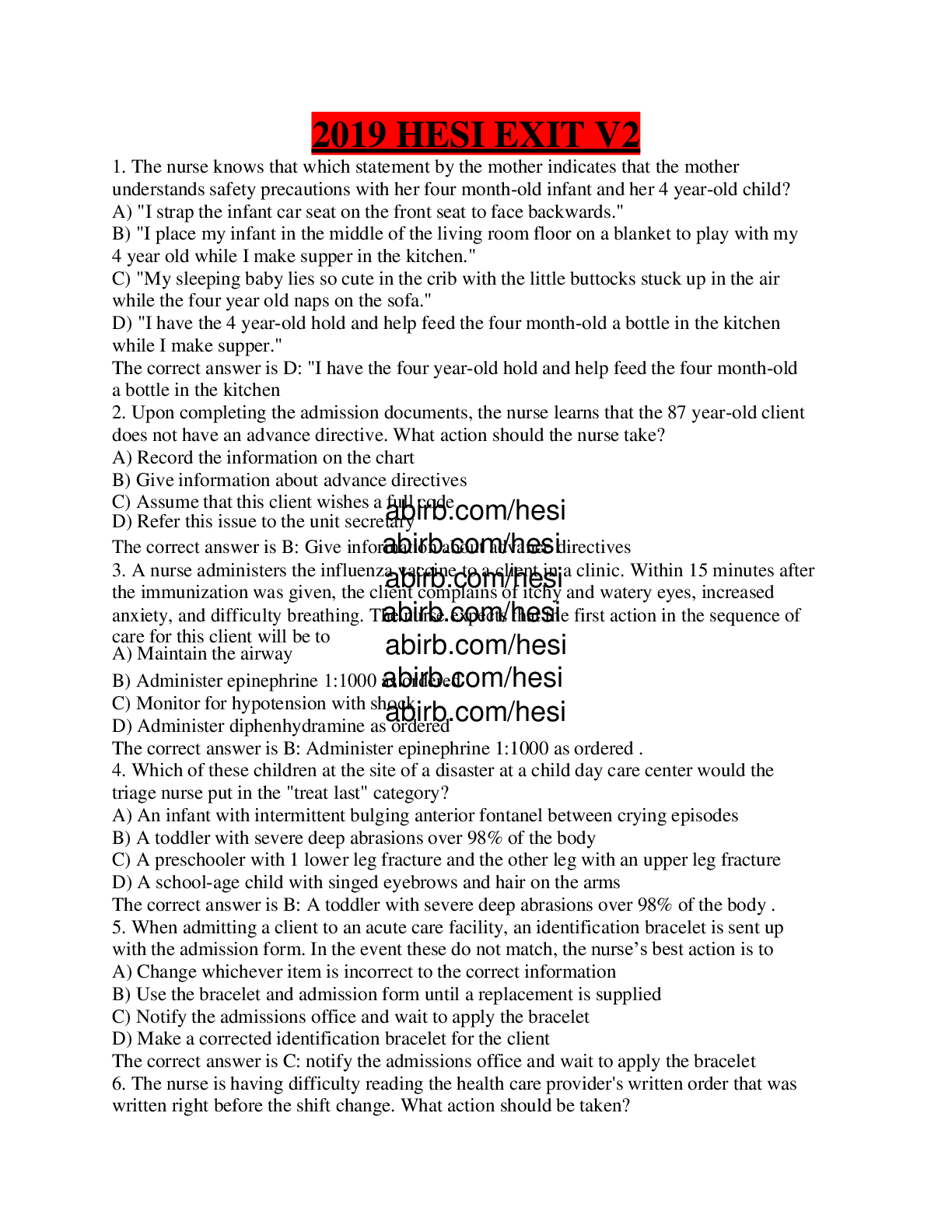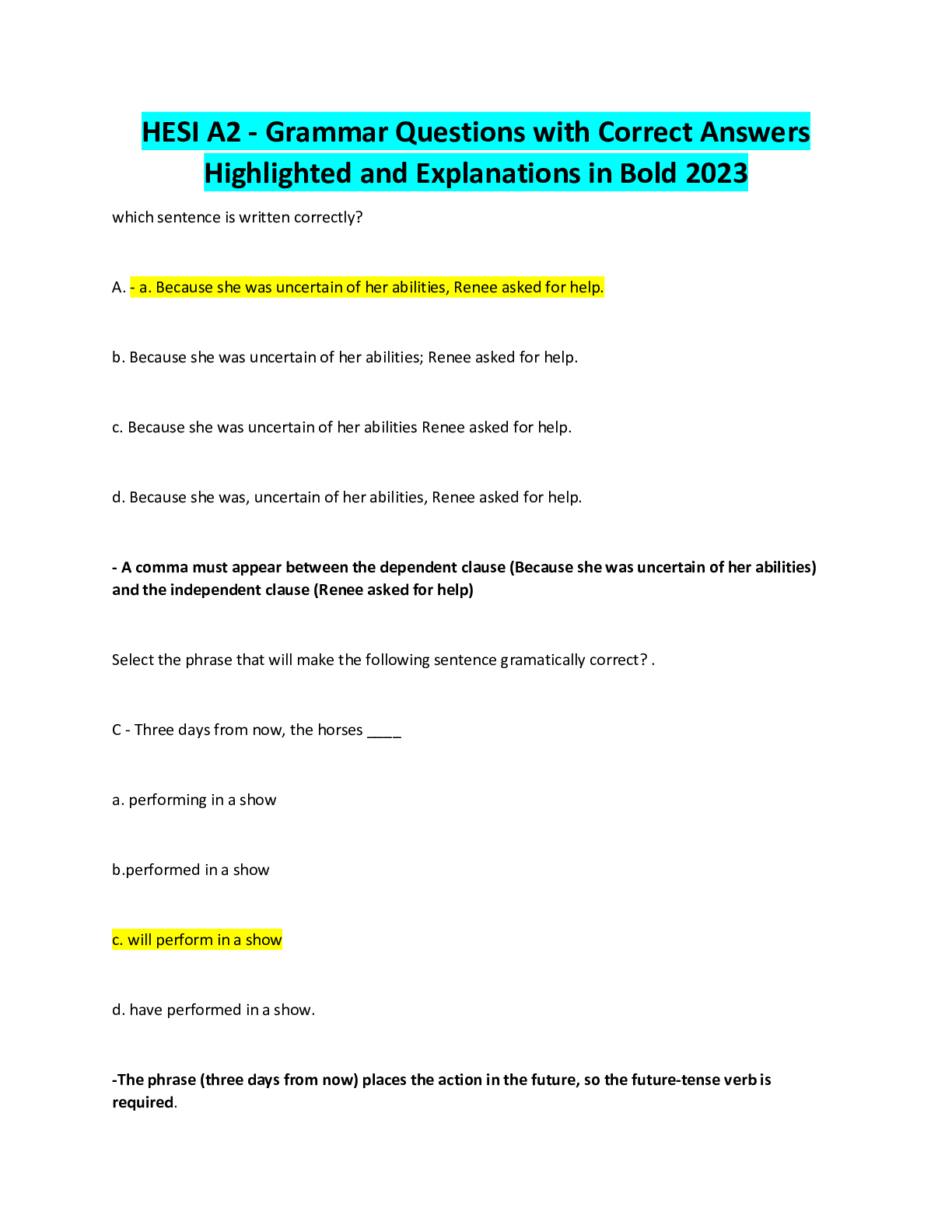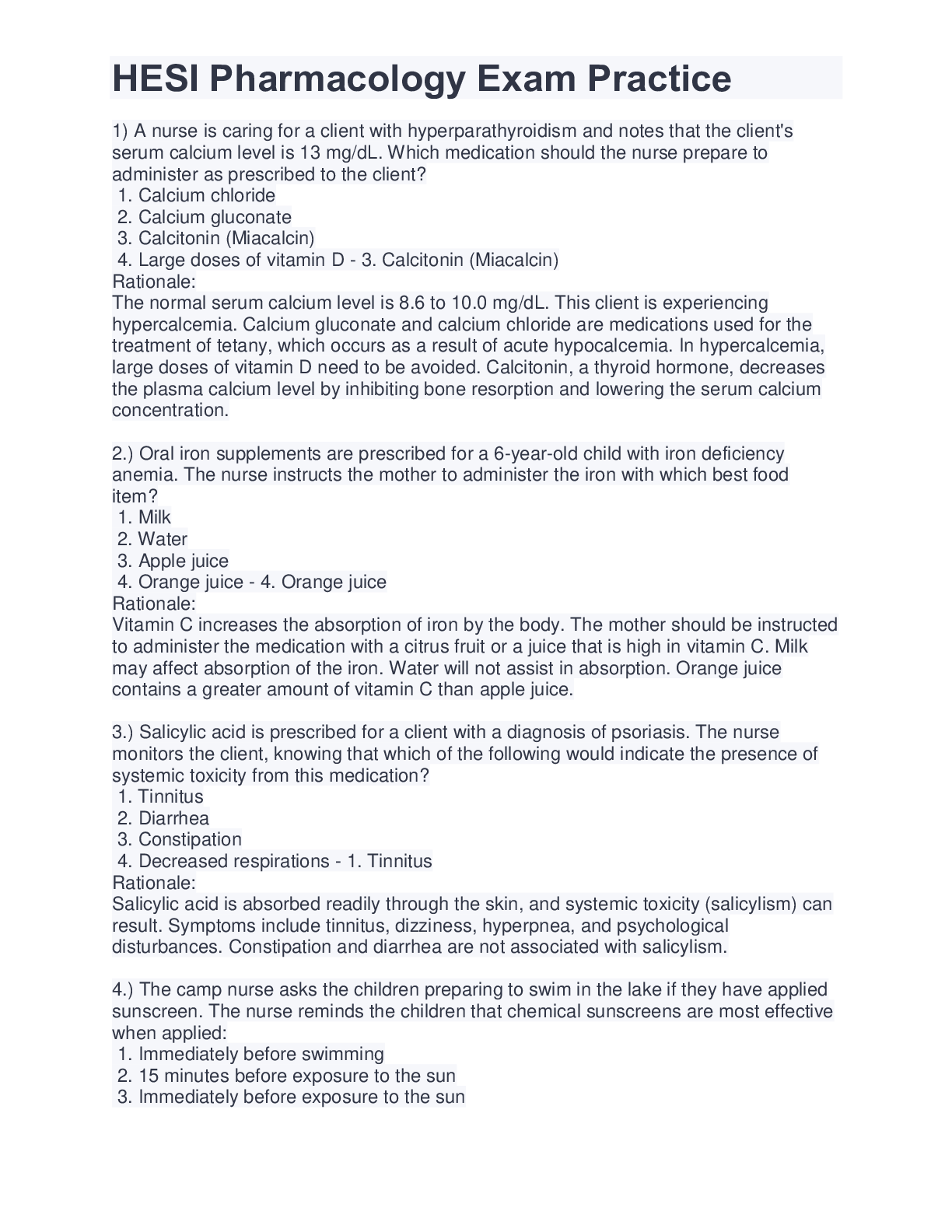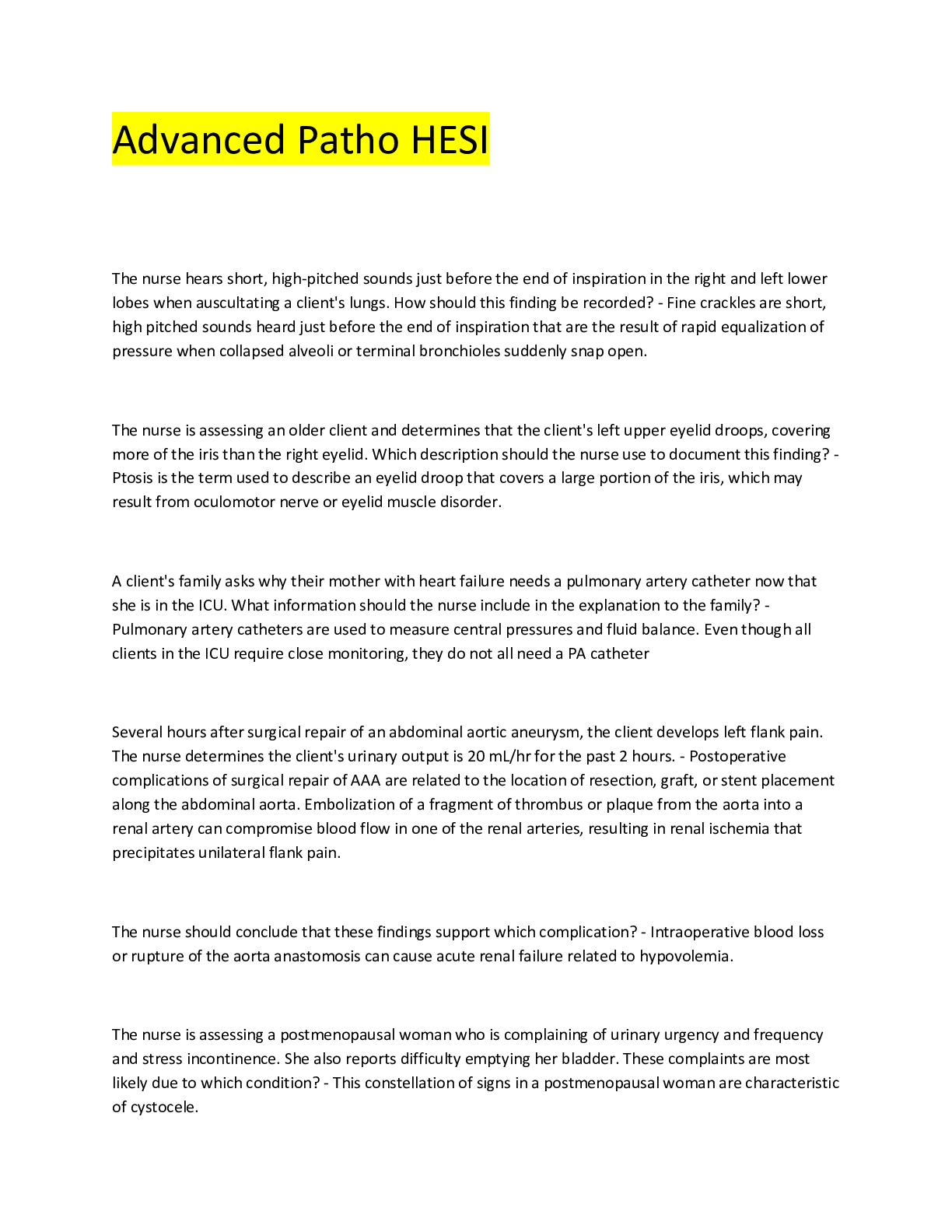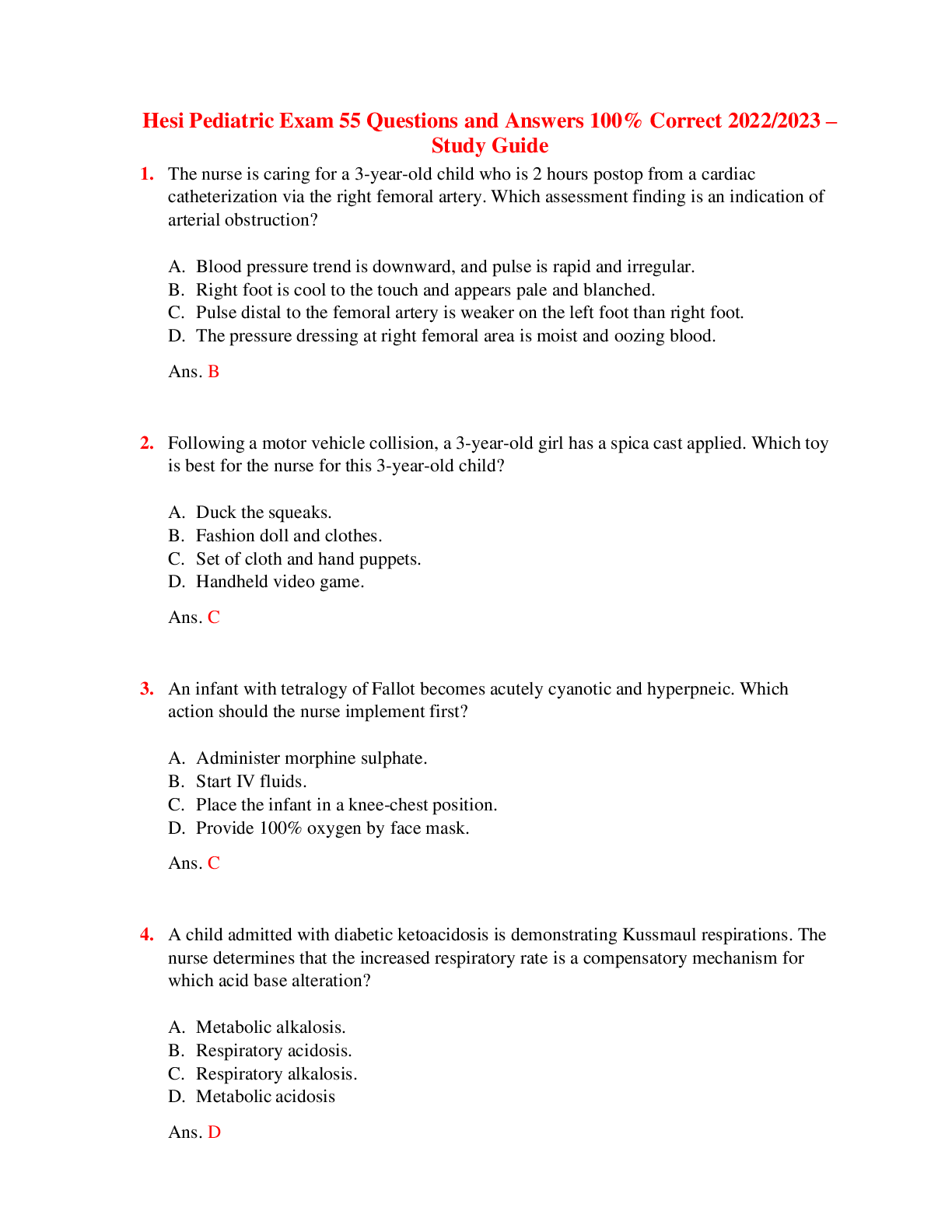*NURSING > HESI > Extra Credit HESI Module 3 – Mental Health Concepts 1. Questions and answers 100% proven pass rate (All)
Extra Credit HESI Module 3 – Mental Health Concepts 1. Questions and answers 100% proven pass rate. Graded A+
Document Content and Description Below
Extra Credit HESI Module 3 – Mental Health Concepts 1. Questions 1. 1.ID: 9477081360 The mother of a 3-year-old child tells the nurse that her child hit her doll after the mother scolded her for... picking the neighbors’ flowers. Which defense mechanism used by the child does the nurse identify in the mother’s report? A. Projection B. Sublimation C. Displacement Correct D. Identification Rationale: The defense mechanism of displacement involves the discharge of intense feelings for one person onto a substitute person or object that is less threatening to satisfy an impulse. Projection involves attributing an attitude, behavior, or impulse, such as that which occurs in blaming or scapegoating, to someone else. Sublimation is the act of rechanneling an impulse into a more socially acceptable object. Identification involves modeling behavior after someone else's. Test-Taking Strategy: Note the subject of the question, defense mechanisms. Focusing on the data in the question and the child’s behavior will direct you to the correct option. Review: these defense mechanisms . Reference: Varcarolis, E., & Halter, M. (2009). Essentials of psychiatric mental health nursing: A communication approach to evidence-based care (p. 133). St. Louis: Saunders. Cognitive Ability: Understanding Client Needs: Psychosocial Integrity Integrated Process: Nursing Process/Assessment Content Area: Mental Health Giddens Concepts: Development, Mood and Affect HESI Concepts: Developmental, Mood and Affect Awarded 1.0 points out of 1.0 possible points. 2. 2.ID: 9477084316 A client says to the nurse, “I’ve been following my diet and taking my medication. What else do you want to talk about today?” Which response would be most helpful during the working phase of the therapeutic alliance? A. “Sounds fine to me. Let’s meet again in 6 months.” B. “I don’t believe that you have been following your diet, because you haven’t lost any weight.” C. “Well, you’ve talked about diet in your terms, but perhaps I should test you on specific things.”Extra Credit HESI Module 3 – Mental Health Concepts D. “Some people have added exercise to diet and medication therapy and gotten positive results. Do you think that this would work for you?” Correct Rationale: Although suggestion or overt giving of advice is sometimes nontherapeutic, these strategies are therapeutic when used in the working phase, because in this situation they will increase the client’s perception of all available options in the treatment plan. Answering, “Sounds fine to me. Let’s meet again in 6 months” stops the communication process. Stating to the client that he or she has not lost any weight implies disbelief and does not explore the reasons for the client’s failure to lose weight. “Testing” challenges the client and is nontherapeutic. Test-Taking Strategy: Note the strategic word “most” and remember therapeutic communication techniques. Noting the words “working phase” in the question will direct you to the correct option. Review: therapeutic communication techniques . Reference: Stuart, G. (2009). Principles & practice of psychiatric nursing (9th ed., pp. 27-31, 553). St. Louis: Mosby. Cognitive Ability: Applying Client Needs: Psychosocial Integrity Integrated Process: Communication and Documentation Content Area: Mental Health Giddens Concepts: Communication, Health Promotion HESI Concepts: Communication, Health, Wellness, and Illness—Health Promotion Awarded 1.0 points out of 1.0 possible points. 3. 3.ID: 9477084348 As the nurse prepares to interview a client being admitted to the mental health unit, the client says, “I asked my family to bring me in here to talk to someone, but now I don’t know where to begin.” Which response by the nurse would be most helpful? A. “Why not just start talking and see where it takes you?” B. “If I were you, I’d begin with what you were doing this morning.” C. “Perhaps you can start by sharing some of your most recent concerns.” Correct D. “Don’t worry. Everyone who comes in here for the first time feels reluctant to talk.” Rationale: The intake interview is usually the first contact with the client. It is intended to establish rapport, to help the nurse understand the client’s current problem and level of functioning, and to help the nurse formulate a nursing care plan. The clinician usually allows the client to set the pace of the interview andExtra Credit HESI Module 3 – Mental Health Concepts uses open-ended questions to elicit a comprehensive diagnostic picture of the client’s problems and level of coping. Sharing concerns is a good place to start the conversation, because it will allow the client to express feelings. The response “Why not just start talking and see where it takes you?” is too general and does not provide the client with a focus on self. Telling the client not to worry is nontherapeutic and avoids addressing the client’s concerns. Test-Taking Strategy: Note the strategic word “most.” Use your knowledge of therapeutic communication techniques. Focusing on the client’s feelings will direct you to the correct option. Review: therapeutic communication techniques . References: Stuart, G. (2009). Principles & practice of psychiatric nursing (9th ed., pp. 27-31). St. Louis: Mosby. Varcarolis, E., & Halter, M. (2009). Essentials of psychiatric mental health nursing: A communication approach to evidence-based care (pp. 117-118). St. Louis: Saunders. Cognitive Ability: Applying Client Needs: Psychosocial Integrity Integrated Process: Communication and Documentation Content Area: Mental Health Giddens Concepts: Communication, Mood and Affect HESI Concepts: Communication, Mood and Affect Awarded 1.0 points out of 1.0 possible points. 4. 4.ID: 9477092800 During a mental health intake interview, a young adult client who lives with his family rent free says, “I’m tired of not being able to offer my friends a beer just because my folks don’t believe in taking a drink socially.” Which nursing response would be therapeutic? A. “Well, I guess you could move out and live on your own if you wanted to.” B. “It seems that your parents expect you to follow their rules when you live under their roof.” Correct C. “You tell me you live rent free, yet you expect the same privileges as an adult who supports the household?” D. “Well, if you directly discussed your concerns with them, I guess it’s a case of ‘When in Rome, do as the Romans do.’” Rationale: The therapeutic nursing response uses reflection, in which the nurse directs the content of the client’s message back for the client to review from a new perspective. This technique also includes an element of focusing on the crux of the issue — in this case, that it is his parents’ home and they set the rules for living in their home, just as he someday will in his. Telling the client to move out is giving advice or suggestions to the client prematurely. Although thisExtra Credit HESI Module 3 – Mental Health Concepts technique can be useful in the working phase, it is usually nontherapeutic when the nurse needs to promote client understanding and self-exploration. Stating, “You tell me you live rent free, yet you expect the same privileges as an adult who supports the household?” is judgmental and poorly timed in that it humiliates the client unnecessarily. The client has acknowledged that he pays no rent, so there is no helpful purpose in reemphasizing this fact. Stating, “Well, if you directly discussed your concerns with them, I guess it’s a case of ‘When in Rome, do as the Romans do.’” is nontherapeutic in that it offers a cliché and expresses hopelessness and powerlessness, two emotions that the client is no doubt already experiencing. Test-Taking Strategy: Use your knowledge of therapeutic communication techniques. This will direct you to the correct option, the nursing response that focuses on the client’s concerns and feelings. Review: therapeutic communication techniques . Reference: Stuart, G. (2009). Principles & practice of psychiatric nursing (9th ed., pp. 27-31). St. Louis: Mosby. Cognitive Ability: Applying Client Needs: Psychosocial Integrity Integrated Process: Communication and Documentation Content Area: Mental Health Giddens Concepts: Communication, Family Dynamics HESI Concepts: Communication, Developmental—Family Dynamics Awarded 1.0 points out of 1.0 possible points. 5. 5.ID: 9477089705 The nurse developing a plan of care for a client whose spouse recently died determines the client has a problem with dysfunctional grieving. Which priority intervention does the nurse incorporate into the plan? A. Monitoring the client’s sleep pattern B. Assessing the client’s risk for violence toward self and others health care provider Correct C. Obtaining a health care provider’s prescription for an antidepressant D. Assisting the client in resolving the grief through emotional, cognitive, and behavioral means Rationale: The priority intervention for a client with dysfunctional grieving is assessing the client’s risk for violence toward self and others. Although the nurse will assist the client in resolving the grief and will monitor the client’s sleep pattern, these are not priorities in the list of options given. Obtaining a health care provider’s prescription for an antidepressant is not a priority. In fact, chemical dependency can present a barrier to the client’s goal attainment. Test-Taking Strategy: Use the steps of the nursing process. Both monitoring theExtra Credit HESI Module 3 – Mental Health Concepts client’s sleep pattern and assessing the client’s risk for violence toward self and others involve assessment. From these options, select the one that addresses the safety of the client. Review: interventions for a client with dysfunctional grieving . Reference: Fortinash, K., & Holoday-Worret, P. (2008). Psychiatric mental health nursing (4th ed., pp. 596, 599-600). St. Louis: Mosby. Cognitive Ability: Applying Client Needs: Psychosocial Integrity Integrated Process: Communication and Documentation Content Area: Mental Health Giddens Concepts: Clinical Judgment, Mood and Affect HESI Concepts: Clinical Decision-Making, Mood and Affect Awarded 1.0 points out of 1.0 possible points. 6. 6.ID: 9477084360 A client in the mental health unit tells the nurse, “My husband makes all the decisions about money, but I’m the one who’s making the money now, not him. He needs to back off, but he’s always directing every decision we make.” Which nursing response would be the most therapeutic? A. “Have you told your husband to back off”? B. “You’re making the most money, so the decisions should be left to you.” C. “How do you feel the money decisions could best be handled in your household?” Correct D. “You seem frustrated with your husband’s habit of controlling financial decisions.” Rationale: The therapeutic nursing response is the one that provides a broad opening or statement and is focused on the client’s feelings. In this response, the nurse will be able to assess what the client believes concerning family financial decision-making. Asking, “Have you told your husband to ‘back off’?” is improperly paraphrasing the client and assumes that the client’s stance is correct. Stating, “You’re making the most money, so decisions should be left to you,” is inappropriate restating and provides an opinion; this response may be seen by the client as reassurance that her interpretation is being judged correct. When stating, “You seem to feel frustrated….,” the nurse is sharing perceptions, which may appear to be challenging to the client when used in this context. Test-Taking Strategy: Use your knowledge of therapeutic communication techniques. Remember to focus on the client’s feelings and to provide the client the opportunity to communicate. This will direct you to the correct option. Review: therapeutic communication techniques . References: Stuart, G. (2009). Principles & practice of psychiatric nursing (9thExtra Credit HESI Module 3 – Mental Health Concepts ed., pp. 27-31). St. Louis: Mosby. Varcarolis, E., & Halter, M. (2009). Essentials of psychiatric mental health nursing: A communication approach to evidence-based care (pp. 380, 381). St. Louis: Saunders. Cognitive Ability: Applying Client Needs: Psychosocial Integrity Integrated Process: Communication and Documentation Content Area: Mental Health Giddens Concepts: Communication, Family Dynamics HESI Concepts: Communication, Developmental—Family Dynamics Awarded 1.0 points out of 1.0 possible points. 7. 7.ID: 9477084328 The nurse is developing a plan of care for a client who recently received a diagnosis of acquired immunodeficiency syndrome and is experiencing difficulty adjusting to the illness. Which action is an inappropriate intervention for this client? A. Monitoring the client for signs of self-harm B. Helping the client verbalize concerns related to fear C. Assisting the client with problem-solving and decision-making D. Discouraging social networking to prevent the spread of infection Correct Rationale: In planning care for a client experiencing difficulty in adjusting to an illness, the nurse develops interventions to promote (not discourage) social networking that will provide needed information to the client. The other options are appropriate interventions. Test-Taking Strategy: Note the strategic word “inappropriate.” Recalling that social support is important will direct you to the correct option. Also, note the relationship between the word “inappropriate” in the question and “discouraging” in the correct option. Review: interventions for a client experiencing difficulty in adjusting to an illness. Reference: Stuart, G. (2009). Principles & practice of psychiatric nursing (9th ed., pp. 483, 484). St. Louis: Mosby. Cognitive Ability: Applying Client Needs: Psychosocial Integrity Integrated Process: Nursing Process/Planning Content Area: Mental Health Giddens Concepts: Clinical Judgment, Immunity HESI Concepts: Clinical Decision-Making/Clinical Judgment, Immunity Awarded 1.0 points out of 1.0 possible points. 8. 8.ID: 9477084366Extra Credit HESI Module 3 – Mental Health Concepts How does a client who has lost a spouse show that she is successfully completing the tasks of mourning? Select all that apply. A. Relating that its better “he went first” B. Reporting that sleeping alone is so hard now Correct C. Purchasing a smaller car she is comfortable driving Correct D. Placing a picture of her husband on the bedside stand Correct E. Heard explaining to family that illness “took” her husband Correct Rationale: The tasks of mourning have been identified as accepting the reality of the loss; experiencing the pain of grief; adjusting to life without the lost one; and relocating and memorializing the loved one. It is not necessary to find a positive aspect to the loss in order to deal with the loss in a psychologically healthy manner. Therefore relating that its better “he went first” is incorrect. Test-Taking Strategy: Use the process of elimination and focus on the subject, completing the tasks of mourning. Recalling the tasks of mourning will direct you to the correct options. Review the tasks related to mourning and grief and loss if you had difficulty with this question. Reference:Varcarolis, E., & Halter, M. (2010). Foundations of Psychiatric Mental Health Nursing: A Clinical Approach. (6th ed., p. 453). Philadelphia: W.B. Saunders. Cognitive Ability:Analyzing Client Needs: Psychosocial IntegrityIntegrated Process: Nursing Process/Assessment Content Area: Mental Health Giddens Concepts: Family Dynamics, Stress HESI Concepts: Grief and Loss, Stress and Coping Awarded 4.0 points out of 4.0 possible points. 9. 9.ID: 9477089778 The psychiatric nurse is caring for a 15-year-old girl who has been hospitalized for bipolar disorder. The client tells the nurse that she had her hair styled just like her young math teacher, whom she admires. Which defense mechanism should the nurse recognize that the client is using? A. Projection B. Regression C. Identification Correct D. Intellectualization Rationale: Identification is the process by which a person tries to become like someone he or she admires by taking on the beliefs, mannerisms, or tastes of that person. Projection is attributing one's thoughts or impulses to another person. Regression is retreating to a behavior characteristic of an earlier level of development. Intellectualization is excessive reasoning or logic used to avoidExtra Credit HESI Module 3 – Mental Health Concepts experiencing disturbed feelings. Test-Taking Strategy: Focus on the subject, the client adjusting her appearance based on a person she admires. Noting that the client is mimicking a characteristic of another person will direct you to the correct option. Review: these defense mechanisms . Reference: Stuart, G. (2009). Principles & practice of psychiatric nursing (9th ed., pp. 377, 378). St. Louis: Mosby. Varcarolis, E., & Halter, M. (2009). Essentials of psychiatric mental health nursing: A communication approach to evidence-based care (p. 136). St. Louis: Saunders. Cognitive Ability: Applying Client Needs: Psychosocial Integrity Integrated Process: Communication and Documentation Content Area: Mental Health Giddens Concepts: Clinical Judgment, Mood and Affect HESI Concepts: Clinical Decision-Making/Clinical Judgment, Mood and Affect Awarded 1.0 points out of 1.0 possible points. 10. 10.ID: 9477089792 The mental health home care nurse says to the client, “Do you feel ready to try attending a group session at the clinic?” The client shakes his head. Which nursing statement would be therapeutic? A. “No? Why not?” B. “You seem to be saying no. Would you tell me more about your reluctance?” Correct C. “OK, but I hope you will let me know when you feel ready to attend a group session at the clinic.” D. “Perhaps a group session would be too overwhelming for you right now. How about just seeing me?” Rationale: The therapeutic nursing statement is seeking clarification. In this statement, the nurse is asking the client to put his ideas into words and explain what he means or feels. This encourages the client to express his reluctance and to try to work out any reservations about attending the group session. In responding, “No? Why not?” the nurse is using a confrontational style, which could lead to a regressive struggle. The nurse expresses doubt and uses a laissez-faire style regarding attending a group session at the clinic when the nurse states “….let me know when you feel ready to attend.” In stating, “Perhaps a group session would be too overwhelming for you right now. How about just seeing me?” the nurse prematurely guesses the reasons for the client’s refusal, and this is not appropriate. Test-Taking Strategy: Draw on your knowledge of therapeutic communication techniques to answer this question. First eliminate the option containing theExtra Credit HESI Module 3 – Mental Health Concepts word “why.” To select from the remaining options, focus on the information in the question. The correct option provides the client the opportunity to verbalize feelings. Review: therapeutic communication techniques . References: Stuart, G. (2009). Principles & practice of psychiatric nursing (9th ed., pp. 27-31). St. Louis: Mosby. Varcarolis, E., & Halter, M. (2009). Essentials of psychiatric mental health nursing: A communication approach to evidence-based care (pp. 38, 39). St. Louis: Saunders. Cognitive Ability: Applying Client Needs: Psychosocial Integrity Integrated Process: Communication and Documentation Content Area: Mental Health Giddens Concepts: Communication, Mood and Affect HESI Concepts: Communication, Mood and Affect Awarded 1.0 points out of 1.0 possible points. 11. 11.ID: 9477084370 A single parent whose son was suspended from school for carrying a gun into the school says to the nurse, “I know he has no dad, but I’ve brought him up to know better, and anyway, where did he get the stupid gun? What should I do? He just won’t listen to me.” Which nursing response would be helpful at this time? A. “Boys who are cared for only by their moms are at highest risk for violent behavior.” B. “There is quite a bit that you can do. Let’s talk about what you’re already doing first.” Correct C. “Do you know all of your son’s friends, or is he left alone after school because you work?” D. “Many young people die of gunshots every day in this country, so your son’s behavior is unacceptable.” Rationale: It is important to help parents to identify children at risk for violent behavior. Unfortunately, this young person has already engaged in threatening and potentially violent behavior, but there are parenting measures and therapies that this single parent can use to help her son express his feelings of anger verbally rather than by acting out. The nurse responds nontherapeutically in telling the mother that boys who are cared for only by their mothers are at high risk for violence; this response could generate guilt in the mother. Asking, “Do you know all of your son’s friends, or is he left alone after school because you work?” is both inappropriate and premature. Telling the woman that her son’s behavior is unacceptable is lecturing an upset parent, which is inappropriate. Test-Taking Strategy: Use your knowledge of therapeutic communicationExtra Credit HESI Module 3 – Mental Health Concepts techniques and focus on the information in the question. Note that the client of the question (the mother) is asking the nurse for assistance. The correct option is the only option that addresses the mother’s concern and encourages verbalization. Review: therapeutic communication techniques . Reference: Stuart, G. (2009). Principles & practice of psychiatric nursing (9th ed., pp. 27-31, 676-678). St. Louis: Mosby. Cognitive Ability: Applying Client Needs: Psychosocial Integrity Integrated Process: Communication and Documentation Content Area: Mental Health Giddens Concepts: Communication, Family Dynamics HESI Concepts: Communication, Development—Family Dynamics Awarded 1.0 points out of 1.0 possible points. 12. 12.ID: 9477084330 A client says to the nurse, “My doctor says he thinks I’m ready to taper off my pain medication, but the new painkiller he prescribed doesn’t relieve my pain the way the other pill did. I get pain when I try to do things.” Which nursing response would be most supportive to the client? A. “Your health care providerhealth care provider feels that your body is physically ready to make the change in medication.” B. “I think you need to listen to your health care provider health care providerwhen it comes to taking such strong medication.” C. “Well, your health care provider is concerned that you will become physically dependent on the first painkiller.” D. “Perhaps if I medicate you about a half-hour before you plan to start your daily activities, the medicine will be more effective.” Correct Rationale: The most supportive response is the one that addresses the client’s concern and provides a plan that will help minimize the client’s pain. If this nursing measure does not afford pain relief, then the nurse can report the client’s continued pain to the health care provider. In stating, “Your health care provider feels that your body is physically ready to make the change in medication,” the nurse is shifting attention from the client’s feelings to the health care provider’s view. In telling the client that he or she needs to listen to the health care provider, the nurse is nontherapeutically giving advice and patronizing the client. Stating, “Well, your doctor is concerned that you will become physically dependent on the first painkiller” is a defensive response, and the nurse’s assertion about dependence may not be based on fact. Test-Taking Strategy: Use your knowledge of therapeutic communication techniques and focus on the subject, the client’s concern about pain relief. Eliminate the options that are comparable or alike and focus on the health careExtra Credit HESI Module 3 – Mental Health Concepts provider, not the client. From the remaining options, select the one that addresses the client’s concern. Review: therapeutic communication techniques . Reference: Stuart, G. (2009). Principles & practice of psychiatric nursing (9th ed., pp. 27-31, 530, 531). St. Louis: Mosby. Cognitive Ability: Applying Client Needs: Psychosocial Integrity Integrated Process: Communication and Documentation Content Area: Mental Health Giddens Concepts: Communication, Pain HESI Concepts: Comfort—Pain, Communication Awarded 1.0 points out of 1.0 possible points. 13. 13.ID: 9477081370 A client who was employed as a corporate manager before being laid off says to the nurse, “My wife thinks that I should work in a menial job to maintain our lifestyles until I find another job as a corporate manager, but I don’t feel I should have to humiliate myself like that.” Which nursing response would be therapeutic? A. “Have you shared your feelings with your wife?” Correct B. “You seem to feel that a less prestigious job would be humiliating for you.” C. “Oh, I agree with you. Let her get another job if she needs that much money.” D. “How soon will you be able to find work? If this is permanent, you may need to swallow your pride.” Rationale: The therapeutic response is the one that helps determine whether the client is sharing his feelings with his wife and providing her with the opportunity to join in the decision-making process. Stating “You seem to feel that a less prestigious job would be humiliating for you” is reflection to some degree; however, its focus is nontherapeutic because the nurse is making a premature judgment of the client’s concerns. In stating, “Oh, I agree with you. Let her get another job if she needs that much money,” the nurse is using a nontherapeutic response of giving approval. “How soon will you be able to find work? If this is permanent, you may need to swallow your pride” is a probing question that the client is probably unable to answer and gives an unsolicited opinion, which is a nontherapeutic communication. Test-Taking Strategy: Use your knowledge of therapeutic communication techniques. Note the words “shared your feelings” in the correct option. Remember to focus on the client’s feelings. Review: therapeutic communication techniques . References: Stuart, G. (2009). Principles & practice of psychiatric nursing (9thExtra Credit HESI Module 3 – Mental Health Concepts ed., pp. 27-31). St. Louis: Mosby. Swearingen, P. (2008). All-in-one care planning resource: Medical-surgical, pediatric, maternity & psychiatric nursing care plans (2nd ed., p. 740). St. Louis: Mosby. Cognitive Ability: Applying Client Needs: Psychosocial Integrity Integrated Process: Communication and Documentation Content Area: Mental Health Giddens Concepts: Clincal Judgment, Communication HESI Concepts: Clinical Decision-Making/Clinical Judgment, Communication Awarded 1.0 points out of 1.0 possible points. 14. 14.ID: 9477081368 A young woman who has been divorced twice says to the nurse, “I’ve decided not to date men ever again! It never works out for me. Now I’m left with two children to bring up.” Which nursing response would be therapeutic? A. “Oh, me too. I always pick the worst kind of men, so I know just how you feel.” B. “Divorce is more difficult for children. Maybe you should focus on them for now.” C. “You’ve been unfortunate, but you seem to be focusing on yourself and what you have to do.” D. “You talk about how the divorces affected you. Tell me how your children are dealing with the loss.” Correct Rationale: When clients experience loss, they can become self absorbed. In responding, “You talk about how the divorces affected you. Tell me how your children are dealing with the loss,” the nurse is trying to refocus the client’s attention on her children and their needs during this time. By stating, “Oh, me too. I always pick the worst kind of men, so I know just how you feel,” the nurse personalizes and exaggerates the client’s problems, using a nontherapeutic response. In stating, “Divorce is more difficult for children. Maybe you should focus on them for now,” the nurse is being judgmental when he or she should be refocusing the client’s energies. In stating, “You’ve been unfortunate, but you seem to be focusing on yourself and what you have to do,” the nurse is responding with empathy, but the choice of wording suggests that the nurse is judging and blaming the client for not focusing on her children. Test-Taking Strategy: Use your knowledge of therapeutic communication techniques. Eliminate the option that is a nontherapeutic response and does not focus on the client’s concern. To select from the remaining options, note that the correct option is the only option that encourages the client to discuss the loss and its effect on her children. Review: therapeutic communication techniques .Extra Credit HESI Module 3 – Mental Health Concepts Reference: Stuart, G. (2009). Principles & practice of psychiatric nursing (9th ed., pp. 27-31, 94). St. Louis: Mosby. Cognitive Ability: Applying Client Needs: Psychosocial Integrity Integrated Process: Communication and Documentation Content Area: Mental Health Giddens Concepts: Clincal Judgment, Communication HESI Concepts: Clinical Decision-Making/Clinical Judgment, Communication Awarded 1.0 points out of 1.0 possible points. 15. 15.ID: 9477084342 A client says to the nurse, “What does my psychiatrist mean when she says that my illness is biologically based?” Which nursing statement would be the most informative? A. “Mental illness always has its roots in the family.” B. “Mental illness is a result of environmental factors.” C. “Today we know that all mental illness is genetically inherited.” D. “There are many possible physical causes of mental illness, and they include problems in the brain.” Correct Rationale: Biologically based mental illnesses are caused by neurotransmitter dysfunction, abnormal brain structure, inherited genetic factors, or other biological causes. Biologically influenced illnesses include schizophrenia, bipolar disorder, major depression, obsessive-compulsive disorder, panic disorder, posttraumatic stress disorder, autism, anorexia nervosa, and attention deficit–hyperactivity disorder. Stating that all mental illness is a result of genetic factors or that it is caused by environmental factors or family dynamics is incorrect and not associated with a biologically based disorder. Test-Taking Strategy: Eliminate the options that include the closed-ended words “always” and “all.” To select from the remaining options, focus on the words “biologically based” in the question, which will direct you to the correct answer. Review: the causes of mental illness . Reference: Varcarolis, E., & Halter, M. (2009). Essentials of psychiatric mental health nursing: A communication approach to evidence-based care (p. 16). St. Louis: Saunders. Cognitive Ability: Applying Client Needs: Psychosocial Integrity Integrated Process: Nursing Process/Implementation Content Area: Mental Health Giddens Concepts: Clincal Judgment, Communication HESI Concepts: Clinical Decision-Making/Clinical Judgment, Communication Awarded 1.0 points out of 1.0 possible points. 16. 16.ID: 9477084377Extra Credit HESI Module 3 – Mental Health Concepts The nurse is caring for a 39-year-old client who has experienced a mild brain attack (stroke). The client is recently widowed, is very active physically, and has two young sons. The client says to the nurse, “I don’t know what my sons will do if anything permanent happens to me. We have no other relatives, even on my late wife’s side.” Which of the following nursing responses would be therapeutic? A. “You seem to be feeling very troubled.” Correct B. “You are working to get better, but you’re worrying about things that aren’t going to happen.” C. “You seem to be feeling very powerless right now, yet you’re getting better, so why worry about what won’t happen?” D. “I am troubled that you are worried over the worst possible things that could happen rather than worrying about the efforts needed to strengthen your family situation.” Rationale: The client has suffered two major losses and is expressing worry and concern about his health and his children. The correct response conveys the nurse’s expression of empathy and willingness to understand and help the client explore ways of coping with difficulties. In stating, “You are working to get better and are doing so. But you are worrying about things that aren’t going to happen,” the nurse is making a pat and clichéd response that may or may not be true. In stating, “You seem to be feeling very powerless right now, yet you’re getting better, so why worry about what won’t happen?” the nurse is displaying empathy but also minimizing the client’s feelings with a false reassurance. In stating “I am troubled that you are worried over the worst possible things that could happen rather than worrying about the efforts needed to strengthen your family situation,” the nurse is not focusing on the client’s concern, and the statement could be interpreted as minimizing or belittling by the client. Test-Taking Strategy: Use your knowledge of therapeutic communication techniques. Select the option that focuses on the client’s feelings and encourages the client to express his feelings. Review: therapeutic communication techniques . References: Stuart, G. (2009). Principles & practice of psychiatric nursing (9th ed., pp. 27-31). St. Louis: Mosby. Varcarolis, E., & Halter, M. (2009). Essentials of psychiatric mental health nursing: A communication approach to evidence-based care (p. 82). St. Louis: Saunders. Cognitive Ability: Applying Client Needs: Psychosocial Integrity Integrated Process: Nursing Process/Implementation Content Area: Mental Health Giddens Concepts: Clincal Judgment, Communication HESI Concepts: Clinical Decision-Making/Clinical Judgment, CommunicationExtra Credit HESI Module 3 – Mental Health Concepts Awarded 1.0 points out of 1.0 possible points. 17. 17.ID: 9477089790 A client who has been admitted to a surgical unit with a diagnosis of cancer is scheduled for surgery in the morning. When the nurse enters the room and begins the surgical preparation, the client states, “I’m not having surgery — you must have the wrong person! My test results were negative. I’ll be going home tomorrow.” Which defense mechanism should the nurse recognize that the client is using? A. Denial Correct B. Psychosis C. Delusions D. Displacement Rationale: Defense mechanisms protect us against anxiety. Denial is the defense mechanism used to block out painful or anxiety-inducing events or feelings. In this case, the client cannot deal with the upcoming cancer surgery and therefore denies that he or she is ill. Psychosis and delusions are not defense mechanisms. Displacement is acting out in anger or frustration with people who did not arouse the feelings. Test-Taking Strategy: Focus on the subject, defense mechanisms. First, eliminate the options that are not defense mechanisms. From the remaining options, focus on the data in the question to find the correct option. Review: defense mechanisms . Reference: Varcarolis, E., & Halter, M. (2009). Essentials of psychiatric mental health nursing: A communication approach to evidence-based care (pp. 135, 136). St. Louis: Saunders. Cognitive Ability: Understanding Client Needs: Psychosocial Integrity Integrated Process: Nursing Process/Assessment Content Area: Mental Health Giddens Concepts: Clincal Judgment, Communication HESI Concepts: Clinical Decision-Making/Clinical Judgment, Communication Awarded 1.0 points out of 1.0 possible points. 18. 18.ID: 9477081366 A young adult client who is dying says to the nurse, “I keep asking my wife what I can do for her and our daughter before I die, but she refuses to tell me.” Based on the client’s statement, what is the appropriate nursing intervention? A. Teaching the client’s wife to write down her thoughts and feelings and to read them to her husband B. Saying to the client, “It sounds to me like your wife is truly comfortable and doesn’t want you to worry needlessly”Extra Credit HESI Module 3 – Mental Health Concepts C. Talking with both the client and his wife about the importance of expressing their feelings and how to do it in healthy ways Correct D. Talking with all family members, including the daughter, about the importance of expressing their concerns and feelings to the dying client Rationale: The appropriate nursing intervention is to help the client and spouse describe feelings that, left unspoken, might cause disruption and delay resolution. Teaching the client’s wife to write down her thoughts and feelings and read them to her husband is inappropriate without a prior determination of the wife’s feelings. In saying to the client, “It sounds to me as if your wife is truly comfortable and doesn’t want you to worry needlessly,” the nurse verbalizes a statement without a basis in fact, a nontherapeutic technique. Talking with all family members is inappropriate and could violate client confidentiality. Test-Taking Strategy: Use your knowledge of therapeutic communication techniques. Eliminate the option that does not address the client’s feelings and places the client’s feelings on hold. Next, eliminate the options that are comparable or alike because they both address an intervention with a family member before determining their feelings. Review: therapeutic communication techniques . References: Ignatavicius, D., & Workman, M. (2010). Medical-surgical nursing: Patient-centered collaborative care. (6th ed., p. 116). St. Louis: Saunders. Stuart, G. (2009). Principles & practice of psychiatric nursing (9th ed., pp. 27- 31). St. Louis: Mosby. Cognitive Ability: Applying Client Needs: Psychosocial Integrity Integrated Process: Nursing Process/Implementation Content Area: Mental Health Giddens Concepts: Clincal Judgment, Communication HESI Concepts: Clinical Decision-Making/Clinical Judgment, Communication Awarded 1.0 points out of 1.0 possible points. 19. 19.ID: 9477092820 A 45-year-old client says to the nurse, “Since I left my wife and children, I can hardly make ends meet between child support and trying to support myself. I don’t know why I bother going to work when my wife and kids take just about everything I make.” Which nursing statement would be therapeutic? A. “I wonder why you left your wife and children.” B. “What would you expect your wife and children to do? They didn’t leave you.” C. “You seem to be very angry about carrying out your responsibility to your children.”Extra Credit HESI Module 3 – Mental Health Concepts D. “Do you feel that child support is designed to help children, not punish spouses who leave?” Correct Rationale: The nurse employs the therapeutic communication technique of seeking clarification to support the client in processing his feelings more specifically. In maintaining a neutral, unbiased, and nonjudgmental stance, the nurse can establish a trusting relationship with the client. In stating, “I wonder why you left your wife and children,” the nurse changes the focus of the client’s concern and uses a “why” question that implies criticism and could cause the client to become defensive. “What would you expect your wife and children to do? They didn’t leave you” is sarcasm, which is nontherapeutic and alienates the client. In stating, “You seem very angry about carrying out your responsibility to your children,” the nurse is making an interpretation and labeling the client’s feelings prematurely. Test-Taking Strategy: Use your knowledge of therapeutic communication techniques. Eliminate the option containing the word “why.” Next, eliminate the option that is sarcastic and the option that labels the client’s feelings. Also note that the correct option is the only option that focuses on the client’s concern and encourages the client to further verbalize feelings. Review: therapeutic communication techniques . Reference: Stuart, G. (2009). Principles & practice of psychiatric nursing (9th ed., pp. 27-31, 94). St. Louis: Mosby. Cognitive Ability: Applying Client Needs: Psychosocial Integrity Integrated Process: Communication and Documentation Content Area: Mental Health Giddens Concepts: Clincal Judgment, Communication HESI Concepts: Clinical Decision-Making/Clinical Judgment, Communication Awarded 1.0 points out of 1.0 possible points. 20. 20.ID: 9477092806 A survivor of a nightclub fire that killed more than 100 people says to the nurse, “It should have been me. How come I got out and they didn’t?” Which response by the nurse is appropriate? A. “I don’t know what to say. It was a terrible fire. I’m so sorry this happened.” B. “It seems that you’re blaming yourself for something that was beyond your control.” Correct C. “It seems to me that you’re making this all about you when many people died in that fire.” D. “You should be thankful that you’re a survivor. The victims and their families lost, not you.”Extra Credit HESI Module 3 – Mental Health Concepts Rationale: The correct option involves the use of the communication technique of reflection and encourages the client to further verbalize his thoughts and feelings. In stating, “I don’t know what to say. It was a terrible fire. I’m so sorry this happened,” the nurse is using a social response and the nontherapeutic communication technique of agreeing. In stating, “It seems to me that you’re making this all about you when many people died in that fire,” the nurse is using the nontherapeutic communication techniques of disapproval and judging. In stating, “You should be thankful that you’re a survivor. The victims and their families lost, not you,” the nurse is nontherapeutically lecturing the client. Test-Taking Strategy: Use your knowledge of therapeutic communication techniques. The correct option is the only option that is therapeutic, involves the use of reflection, and encourages verbalization of the client’s feelings. Review: therapeutic communication techniques . Reference: Stuart, G. (2009). Principles & practice of psychiatric nursing (9th ed., pp. 27-31, 283). St. Louis: Mosby. Cognitive Ability: Applying Client Needs: Psychosocial Integrity Integrated Process: Communication and Documentation Content Area: Mental Health Giddens Concepts: Communication, Mood and Affect HESI Concepts: Communication, Mood and Affect Awarded 1.0 points out of 1.0 possible points. 21. 21.ID: 9477081358 In planning the care of a client dying of cancer, the nurse seeks to have the client verbalize acceptance of his impending death. Which statement indicates to the nurse that this goal has been met? A. “I’d like to have my family here when I die.” Correct B. “I’ll be ready to die once my daughter gets married.” C. “I want to go to my family reunion; then I’ll be ready to die.” D. “I just want to live to see my grandchildren graduate from college.” Rationale: Acceptance is often characterized by plans for death. Often the client wants loved ones near. Therefore the statement “I’d like to have my family here when I die” indicates acceptance of impending death. The incorrect options reflect the bargaining stage of coping, in which the client tries to negotiate with his or her God or with fate. Test-Taking Strategy: Eliminate the options that are comparable or alike and demonstrate negotiation for something else to happen before death occurs. The correct option is the option that reflects acceptance. Review: the stages of death and dying .Extra Credit HESI Module 3 – Mental Health Concepts References: Black, J., & Hawks, J. (2009). Medical-surgical nursing: Clinical management for positive outcomes. (8th ed., pp. 300, 301). St. Louis: Saunders. Stuart, G. (2009). Principles & practice of psychiatric nursing (9th ed., pp. 27- 31, 732). St. Louis: Mosby. Cognitive Ability: Evaluating Client Needs: Psychosocial Integrity Integrated Process: Nursing Process/Evaluation Content Area: Mental Health Giddens Concepts: Cellular Regulation, Mood and Affect HESI Concepts: Cellular Regulation, Mood and Affect Awarded 1.0 points out of 1.0 possible points. 22. 22.ID: 9477081398 A client says to the nurse at the mental health clinic, “My husband and sister-inlaw both have terminal illnesses, and my family thinks that because I’m a nurse I should be able to handle everything.” Which nursing response would be therapeutic? A. “Are you saying you are overly involved and will need to emotionally distance yourself to be therapeutic for your family?” B. “Shame on them for expecting so much from you. Perhaps we need to schedule a family meeting so I can help you set them straight.” C. “I’m sorry to hear that your loved ones are so ill. As a nurse, you should be able to assist them by using your professional expertise. Perhaps that’s what your family expects from you.” D. “You’ve seen your loved ones dealing with some troubling events recently. Sounds as if you feel that your family expects more from you than from others in the family because you’re a nurse.” Correct Rationale: The therapeutic response is the one in which the nurse makes observations and then clarifies his or her perception of what the client has said. Stating, “Are you saying you are overly involved and will need to emotionally distance yourself to be therapeutic for your family?” is paraphrasing, a therapeutic technique, but this response is premature and reflects unfounded assumptions. In stating, “Shame on them for expecting so much from you. Perhaps we need to schedule a family meeting so I can help you set them straight,” the nurse expresses disapproval, a nontherapeutic communication technique, and then offers to “beat up” the family verbally in a family intervention. The statement “I’m sorry to hear that your loved ones are so ill. As a nurse, you should be able to assist them, using your professional expertise. Perhaps that’s what your family expects from you,” expresses sympathy butExtra Credit HESI Module 3 – Mental Health Concepts also lectures the client Test-Taking Strategy: Use your knowledge of therapeutic communication techniques. The correct option is the only option that specifically addresses the client’s feelings and encourages verbalization about the client’s concern. Review: therapeutic communication techniques . Reference: Stuart, G. (2009). Principles & practice of psychiatric nursing (9th ed., pp. 27-31). St. Louis: Mosby. Cognitive Ability: Applying Client Needs: Psychosocial Integrity Integrated Process: Communication and Documentation Content Area: Mental Health Giddens Concepts: Clinical Judgment, Communication HESI Concepts: Clinical Decision-Making/Clinical Judgment, Communication Awarded 1.0 points out of 1.0 possible points. 23. 23.ID: 9477089776 A 79-year-old client, recently widowed, says to the nurse, “My wife kept up our condominium single-handedly, and now my kids expect me to cook and clean for myself. I’m not lazy, but I don’t know how to cook and I’ve burnt myself twice just frying up what was supposed to be bacon and eggs. I’m so frustrated and I’ve already lost 10 lb (4.5 kg) this month. Which initial nursing statement should the nurse make to the client? A. “I’m calling the doctor immediately to obtain a homemaker for you!” B. “Seems as if you feel lost without your wife and maybe a bit ignored by your children.” Correct C. “First things first. What are you doing eating bacon and eggs? That’s not a good meal fo [Show More]
Last updated: 1 year ago
Preview 1 out of 94 pages
Instant download
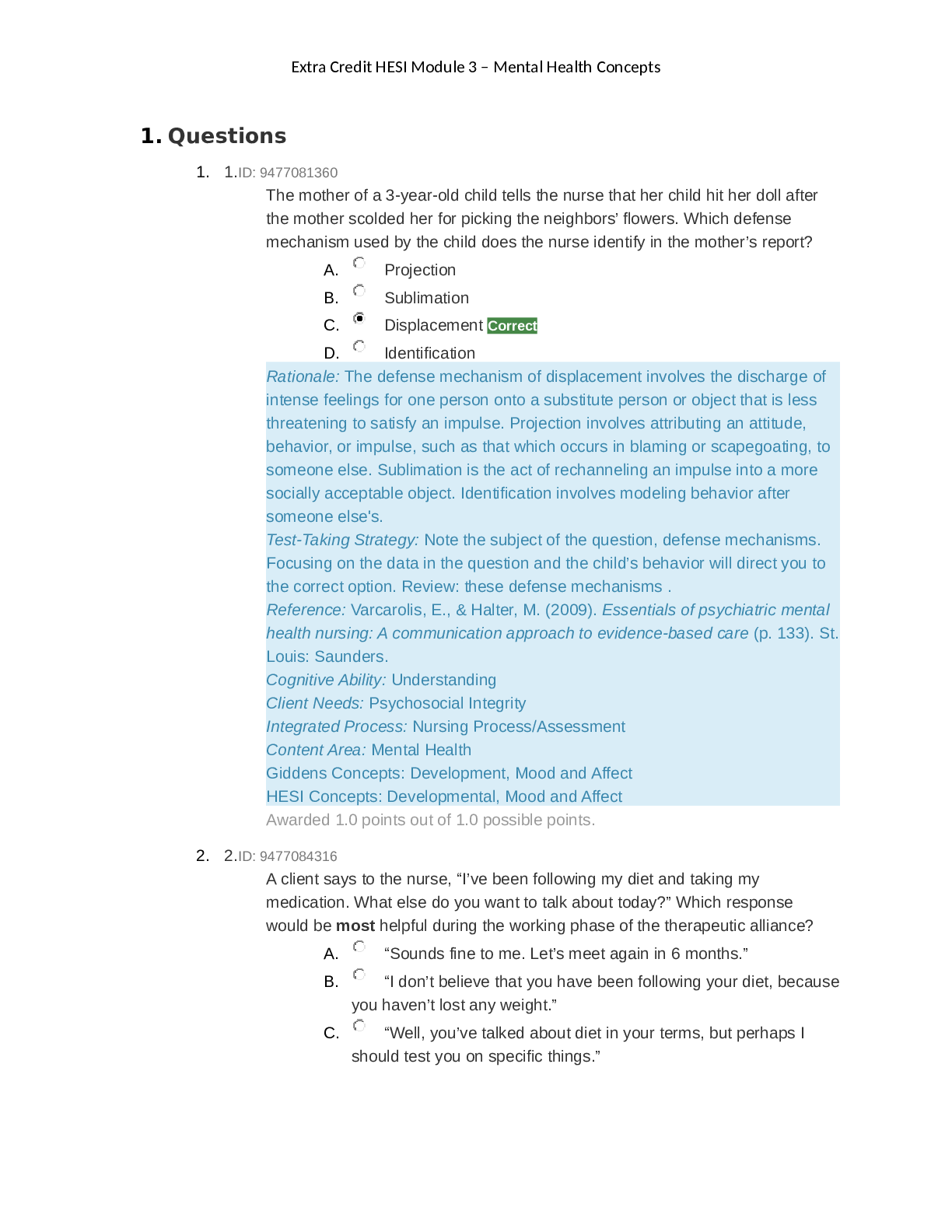
Buy this document to get the full access instantly
Instant Download Access after purchase
Add to cartInstant download
Reviews( 0 )
Document information
Connected school, study & course
About the document
Uploaded On
Aug 30, 2022
Number of pages
94
Written in
Additional information
This document has been written for:
Uploaded
Aug 30, 2022
Downloads
0
Views
80

